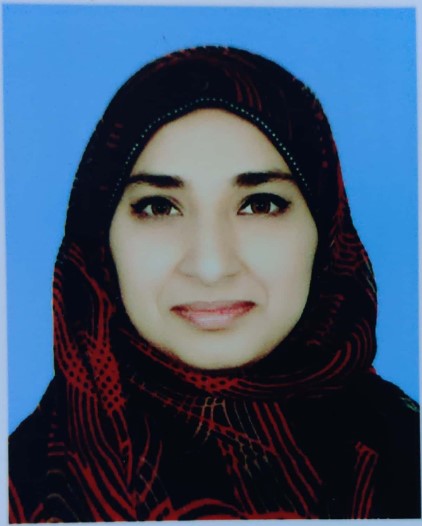概要
I completed my MBBS degree from FMH College of Medicine and Dentistry in 2013 , did 1 year housejob from FMH hospital Lahore in Medicine , General Surgery , Gynaecology , Pediatric Medicine , Psychiatry and Radiology .
Worked as Women Medical Officer in Accident and Emergency of BBH for almost 2 years . Completed 4yrs postgraduate training in Radiation Oncology from AECH NORI. During my training I have done 1 year of rotations in Medicine , Pathology ,Psychiatry , Anaesthesia from PIMS hospital Islamabad , Medical Oncology from CMH Rawalpindi and Diagnostic Radiology and Nuclear Medicine from NORI. Currently unemployed and looking for job opportunity to serve humanity.
工作经历
Post Graduate Trainee
The duties were as postgraduate trainee in radiation oncology include a wide range of clinical, educational, and research-related tasks. Here are some common duties: Undergo supervised training in delivering radiation therapy to cancer patients, including planning treatment, administering radiation, and monitoring patient progress. Participate in multidisciplinary meetings to discuss patient cases and treatment plans with other oncologists, surgeons, and medical professionals. Conduct thorough patient assessments, including medical history reviews, physical examinations, and imaging studies. Learn to create radiation treatment plans that deliver the optimal dose of radiation to target cancer cells while minimizing damage to healthy tissues. Work with medical physicists and dosimetrists to plan and calculate radiation dosages accurately. Engage in clinical research projects, including designing studies, collecting data, and analyzing results to contribute to advancements in radiation oncology. Participate in clinical trials aimed at evaluating new treatment techniques, technologies, and drugs in radiation therapy. Meet with patients and their families to explain treatment options, potential side effects, and answer their questions. Offer emotional support to patients as they navigate their cancer diagnosis and treatment journey. Attend educational conferences, seminars, and grand rounds to learn from experienced radiation oncologists and stay updated on the latest research and techniques. Present cases, research findings, or literature reviews to fellow trainees, faculty, and medical staff. Keep up-to-date with developments in the field of radiation oncology by regularly reading medical literature and attending conferences. Follow strict quality assurance protocols to ensure patient safety and accurate treatment delivery. Monitor and assess treatment outcomes, making adjustments to treatment plans as necessary. Collaborate with other healthcare professionals, including medical physicists, dosimetrists, nurses, and radiographers, to provide comprehensive patient care. Develop clinical skills, procedural competency, and decision-making abilities under the guidance of experienced radiation oncologists. Prepare for licensing and board certification exams upon completion of training. Uphold ethical standards in patient care, including informed consent and confidentiality. Advocate for the best interests of patients and promote their well-being throughout the treatment process.
Women Medical Officer
My duties as a Women Medical Officer (WMO) in an emergency medical setting can vary depending on the specific context, the healthcare facility, and the nature of the emergency. However, here are some common duties that a Women Medical Officer might perform in an emergency situation: Triage and Assessment: Prioritize patients based on the severity of their condition, provide initial medical assessment, and determine the appropriate level of care needed. Emergency Medical Treatment: Provide immediate medical care and interventions to stabilize patients, address life-threatening conditions, and manage injuries. Coordination and Communication: Collaborate with other healthcare professionals, emergency responders, and staff to ensure efficient and effective patient care. Communicate with patients and their families about treatment plans and procedures. Medical Procedures: Perform medical procedures such as wound care, suturing, setting fractures, and other necessary interventions. Medical Record Keeping: Maintain accurate and up-to-date medical records for patients treated during the emergency, including assessments, treatments, and outcomes. Medication Administration: Administer medications as needed, ensuring proper dosages and monitoring for any adverse reactions. Emergency Obstetrics and Gynecology: Provide care for pregnant women, including managing labor and delivery complications, as well as addressing gynecological emergencies. Patient Advocacy: Ensure that patients' rights are respected and that they receive appropriate care and support. Infection Control: Adhere to infection control protocols to prevent the spread of infections within the emergency medical setting. Team Leadership: In some cases, a Women Medical Officer might be responsible for leading a medical team in the emergency department, delegating tasks, and ensuring coordinated care. Emergency Preparedness: Contribute to emergency preparedness plans, including training and drills, to ensure the healthcare facility is ready to respond to emergencies effectively. Patient Education: Educate patients and their families about their medical conditions, treatment options, and preventive measures. Psychosocial Support: Provide emotional support to patients and families who are dealing with the stress and trauma of emergency situations. Ethical Decision-Making: Make informed decisions in high-pressure situations while considering ethical and medical guidelines
House Officer
Done house job in Medicine, Pediatric Medicine, Psychiatry, Surgery-II, Obs/Gyane-Iv, Radiology

